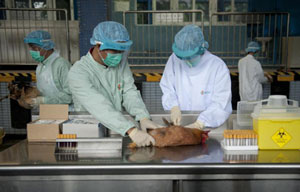
Women who have sufficient amounts of vitamin D are 32 percent less likely to develop fibroids than women with insufficient vitamin D, according to a study published in the journal of Epidemiology.
The study, conducted by researchers at the U.S. National Institutes of Health (NIH), consisted of 1,036 women aged 35-49 and living in the Washington, D.C. area from 1996 to 1999.
The researchers screened participants for fibroids using ultrasound and used blood samples to measure the primary circulating form of vitamin D, known as 25-hydroxy D.
Those with more than 20 nanograms per milliliter of 25-hydroxy D were categorized as sufficient. Participants then completed a questionnaire on sun exposure.
Those who reported spending more than one hour outside per day also had a decreased risk of fibroids, said the researchers. The estimated reduction was 40 percent.
"It would be wonderful if something as simple and inexpensive as getting some natural sunshine on their skin each day could help women reduce their chance of getting fibroids," said Donna Baird, a researcher at the National Institute of Environmental Health Sciences, part of NIH.
Baird noted that though the findings are consistent with laboratory studies, more studies in women are needed.
|
|
|

2013 Chinese New Year |

Hidden dragons, crouching tigers |

Soap beans, silver ears and peach gum |

Special:Winter Solstice |

Mario themed restaurant opens in Tianjin |

HK carries out avian influenza tests on imported chicken |

2013 China Tea Conference kicks off in Zhejiang |

Oysters make spring sing for diners in Beijing |